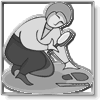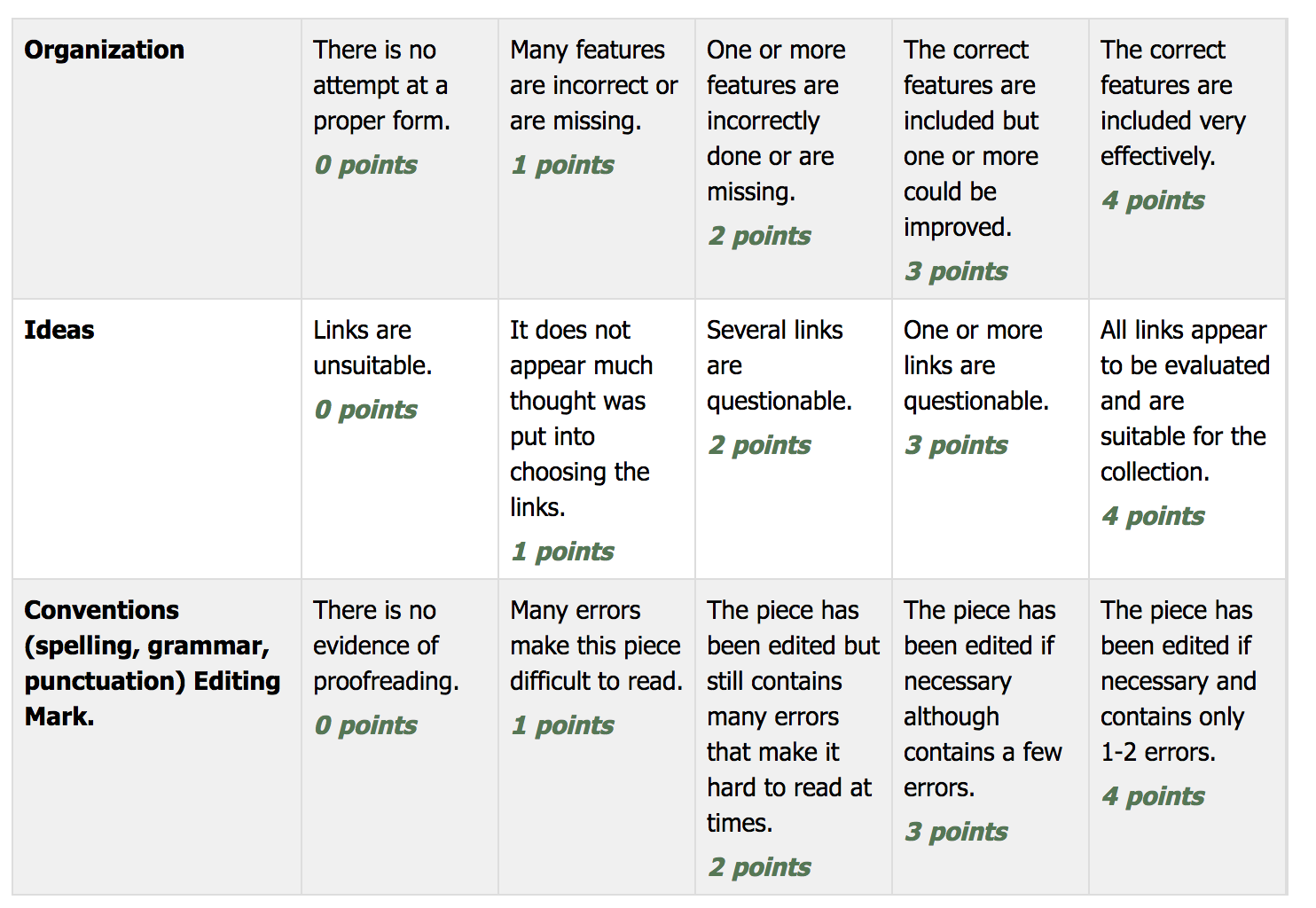3.2 Reading Projects-Unit 3
| Site: | Cowichan Valley School District - Moodle |
| Course: | ELA8, CSS, Sferrazza |
| Book: | 3.2 Reading Projects-Unit 3 |
| Printed by: | Guest user |
| Date: | Tuesday, 6 January 2026, 8:08 PM |
Description
3 Choices.
Project Overview
In the previous book module you developed a more focused topic from the question,
What does the future look like? What is your role in your future? What is your role in the future of the planet? Where do you fit in?
In this section you will create a curated collection of resources around your topic and organize and present your findings using a tool called Zeef.
Overview of Project:
- Create a Zeef account and page.
- Refine search skills and evaluate resources.
- Organize resources.
- Curate and Share collection.
Evaluation will be based on organization, ideas, and conventions (spelling, grammar, punctuation).
Click here for the rubric that will be used to grade your assignment.
About Zeef
Zeef is described as a "curated directory, where passionate people create top lists of links about their favourite topics. They have sifted and ranked the best results for you."
Here is an example of one page: Click on the picture to go to the site and explore the features. You might also try a search of your own in the search box.
Start Your Own Account
Click here to create your own page. Follow the instructions as you go through the steps.
Title: If you aren't sure of the title, you will have the option to change it later.
Suggested sites: As soon as you enter your title some suggested sites will appear. You may add some now and decide if you want to keep them later.
Sign-Up: Do not sign up with another account but rather use an email and create a new password and save it in a safe place.
Read this article about why you shouldn't sign up with another account
To add a new block simply click on the large plus sign and choose the links option.
But WAIT! Before starting go to the next page and learn about searching for and evaluating sites.
Criteria for Your Zeef Page
Before you start to create your zeef page on your topic, keep in mind this criteria:
- 5 different blocks x 5 links for each. Choose your own categories for the blocks except one must be a deep web category (explained later in this book).
- For each block include a header description of the category.
- For each link, provide a short description using this template:
Before typing your description define the type of resource-video, article, interview, etc., the year and the author or organization if possible.
Example
Article, 2016, Smith, University of A......
Searching: What is a Query?
A web search query is a query that a user enters into a web search engine to satisfy his or her information needs. Web search queries are distinctive in that they are often plain text or hypertext with optional search-directives (such as "and"/"or" with "-" to exclude).
- Read carefully about tips and hints for creating an effective and efficient query by downloading this pdf:
You will need to know this information to complete the next activity.
- Do one or more keyword search challenges below. Don't feel badly if it takes a couple of tries to get close to 80%
The Deep (Invisible Web)
The deep web, invisible web, or hidden web are parts of the World Wide Web whose contents are not indexed by standard search engines for any reason. The content is hidden behind HTML forms. The opposite term to the deep web is the surface web, which is accessible to anyone using the Internet. The deep web includes many very common uses such as web mail and online banking but it also includes services that users must pay for, and which is protected by a paywall, such as video on demand, some online magazines and newspapers, and many more. Computer scientist, Michael K. Bergman, is credited with coining the term deep web in 2001 as a search indexing term.
Adapted from https://en.wikipedia.org/wiki/Deep_web#cite_note-cthw-3
Evaluating Websites
Criteria for Evaluating Websites
Author
Find and Evaluate the Author

Before information is used or cited, it is important to find out who the author is and what makes the author qualified to write on the subject.
Online articles and web pages often do not clearly include the name of the author. When this happens, it helps to know several investigative techniques.
from: https://21cif.com/rkitp/course/twohourworkshop/authorfind.html
Techniques to locate the author
Here are examples of pages where the author is not clearly named:
Use these techniques to locate authors:
-
If looking on the page doesn't reveal an author's name, look on the Web site. Scroll to the bottom.
-
Try truncating the url to see if there are clues about authorship or links to an author on other pages--remove the end of the address back to a significant break ( / ) or the root of the site.
-
If the site provides links to 'about us' or 'contact us,' check there for author information.
-
If the site provides a search engine, enter the name of the article and see if information about the author is retrieved. This may require careful reading.
-
Search a different site. Enter information about the article in search engines like Google and see if any information about the author is retrieved. This may require careful reading.
from: https://21cif.com/rkitp/course/twohourworkshop/authorfind_help.html
Once an author's name is available, search for information using the author's name in Google or a similar search engine. Entering keywords such as 'education' or "employment' in addition to the author's name may help retrieve information about where the author attended school, graduated or works. Be nosy -- look for facts and check those out to see if they hold up.
Also pay attention to the way an author expresses opinions or facts. Are there indications of bias?
Publisher
Find and Evaluate the Publisher
Before information is used or cited, it is important to find out who the publisher is--especially if an author cannot be found--and what makes them qualified to publish on the subject.
If an author for an online article or web page cannot be found, then it is imperative to find the publisher or organization responsible for hosting the Web site. The publisher can almost always be found.
from: https://21cif.com/rkitp/course/twohourworkshop/publisherfind.html
Techniques to locate the publisher
Here are examples of pages where the publisher is not clearly named:
Use these techniques to locate publishers:
If looking on the page doesn't reveal a publisher's name, look on the Web site. Try truncating the url to see if there are clues about who is responsible or links to a publisher on other pages--remove the end of the address back to a meaningful break ( / ) or the root of the site (e.g., 21cif.imsa.edu/). The root of the site often reveals the publisher or provides good places to start browsing.
If the site provides links to 'about us' or 'contact us,' check there for publisher information.
If the url is an edu site and includes a tilde ( ~ ), the name immediately following usually leads to the Web page owner (same as publisher).
Use allwhois.net/ or a similar type of domain look-up site (e.g. nswhois.domainregistry) to search for the owner of the Web site. This is often the author as well as the publisher. The author should also be considered the publisher in most Web 2.0 applications (Blogs, Twitter, Digg, etc.)
Evaluation
Search for information using the publisher's or copyright owner's name in Google or a similar search engine. Be nosy -- look for facts about the publisher and check those out to see if they hold up.
Evaluate one or more of these publishers:
Look at the history of the publisher, other works published, reputation and objectivity. What do the findings indicate about the credibility of their work?
Date
Find and Evaluate the Date
Before information is used or cited, it is important to find out how old it is and if that makes a difference.
The date of an online article or the last time a Web page was modifed is not always possible to find. Depending on the nature of the information and its purpose, being confident that it is recent enough for current events or old enough accurately to reflect historical perspectives can be vitally important.
from: https://21cif.com/rkitp/course/twohourworkshop/datefind.html
Techniques to locate the date
Here is an example of a page where the date is not clearly identified:
Use these techniques to locate date information:
If looking at the top or bottom of the page doesn't immediately reveal a date, look in columns, headings, captions--anywhere such a detail could hide. Authors don't always put the date in predictable places.
Sometimes the last date a page was modified can be determined by right clicking the page and selecting 'View Page Info' (in Firefox) or 'Properties' (in IE). This doesn't necessarily mean the article was authored on this date--just that something on the page was modified then. If the information provided is very recent (seconds ago) it indicates code that automatically updates page information whether the author changed it or not.
If you can't spot "last updated" information on the page, replace the url with this code and hit enter: javascript:alert(document.lastModified) If page update information is available, this will return it. If not, the time stamp when you hit enter will likely be returned.
Search Google, etc. using the title of the article to see if other extant copies include a date.
If it is critical that a historical date be established, consider searching archive.org for saved copies of the page to determine when changes to a page were made. This requires reading and comparing documents.
from https://21cif.com/rkitp/course/twohourworkshop/datefind_help.html
Links
Find and Evaluate Links
Before information is used or cited, it is important to check out its online references: who links to it and what links the author has placed on the page.
Links are one of the easiest credibility indicators to locate. Search engines index all the pages that a Web page links to, which makes it possible to search for the pages in the search engine's database that point back to a page of interest.
from: https://21cif.com/rkitp/course/twohourworkshop/linksfind.html
Techniques to locate links
Here are examples of pages where it is important to find links:
Pacific Northwest Tree Octopus
Use this technique to locate links to a page:
- The advanced operator link: retrieves all the pages in the database that contain a link to the page in question.
- For example, link:http://21cif.imsa.edu/ retrieves all the pages that link to the Information Fluency home page.
- Google, Yahoo! and similar search engines may provide a copy-paste shortcut in Advanced Search (pages that link to).
- Note: there must be no space after link: otherwise the query becomes a search for link AND whatever url was pasted in.
Use this technique to locate links from a page:
True Curation
Now it's time to complete your curated collection. You will be assessed according to the following rubric.
